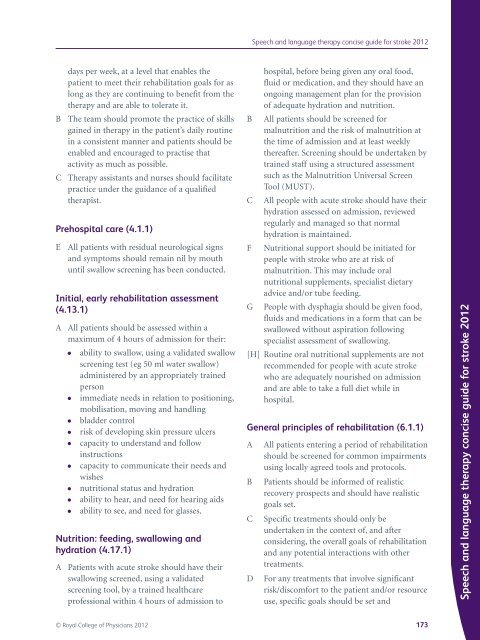national-clinical-guidelines-for-stroke-fourth-edition
national-clinical-guidelines-for-stroke-fourth-edition
national-clinical-guidelines-for-stroke-fourth-edition
You also want an ePaper? Increase the reach of your titles
YUMPU automatically turns print PDFs into web optimized ePapers that Google loves.
days per week, at a level that enables the<br />
patient to meet their rehabilitation goals <strong>for</strong> as<br />
long as they are continuing to benefit from the<br />
therapy and are able to tolerate it.<br />
B The team should promote the practice of skills<br />
gained in therapy in the patient’s daily routine<br />
in a consistent manner and patients should be<br />
enabled and encouraged to practise that<br />
activity as much as possible.<br />
C Therapy assistants and nurses should facilitate<br />
practice under the guidance of a qualified<br />
therapist.<br />
Prehospital care (4.1.1)<br />
E All patients with residual neurological signs<br />
and symptoms should remain nil by mouth<br />
until swallow screening has been conducted.<br />
Initial, early rehabilitation assessment<br />
(4.13.1)<br />
A All patients should be assessed within a<br />
maximum of 4 hours of admission <strong>for</strong> their:<br />
● ability to swallow, using a validated swallow<br />
screening test (eg 50 ml water swallow)<br />
administered by an appropriately trained<br />
person<br />
● immediate needs in relation to positioning,<br />
mobilisation, moving and handling<br />
● bladder control<br />
● risk of developing skin pressure ulcers<br />
● capacity to understand and follow<br />
instructions<br />
● capacity to communicate their needs and<br />
wishes<br />
● nutritional status and hydration<br />
● ability to hear, and need <strong>for</strong> hearing aids<br />
● ability to see, and need <strong>for</strong> glasses.<br />
Nutrition: feeding, swallowing and<br />
hydration (4.17.1)<br />
A Patients with acute <strong>stroke</strong> should have their<br />
swallowing screened, using a validated<br />
screening tool, by a trained healthcare<br />
professional within 4 hours of admission to<br />
Speech and language therapy concise guide <strong>for</strong> <strong>stroke</strong> 2012<br />
hospital, be<strong>for</strong>e being given any oral food,<br />
fluid or medication, and they should have an<br />
ongoing management plan <strong>for</strong> the provision<br />
of adequate hydration and nutrition.<br />
B All patients should be screened <strong>for</strong><br />
malnutrition and the risk of malnutrition at<br />
the time of admission and at least weekly<br />
thereafter. Screening should be undertaken by<br />
trained staff using a structured assessment<br />
such as the Malnutrition Universal Screen<br />
Tool (MUST).<br />
C All people with acute <strong>stroke</strong> should have their<br />
hydration assessed on admission, reviewed<br />
regularly and managed so that normal<br />
hydration is maintained.<br />
F Nutritional support should be initiated <strong>for</strong><br />
people with <strong>stroke</strong> who are at risk of<br />
malnutrition. This may include oral<br />
nutritional supplements, specialist dietary<br />
advice and/or tube feeding.<br />
G People with dysphagia should be given food,<br />
fluids and medications in a <strong>for</strong>m that can be<br />
swallowed without aspiration following<br />
specialist assessment of swallowing.<br />
[H] Routine oral nutritional supplements are not<br />
recommended <strong>for</strong> people with acute <strong>stroke</strong><br />
who are adequately nourished on admission<br />
and are able to take a full diet while in<br />
hospital.<br />
General principles of rehabilitation (6.1.1)<br />
A All patients entering a period of rehabilitation<br />
should be screened <strong>for</strong> common impairments<br />
using locally agreed tools and protocols.<br />
B Patients should be in<strong>for</strong>med of realistic<br />
recovery prospects and should have realistic<br />
goals set.<br />
C Specific treatments should only be<br />
undertaken in the context of, and after<br />
considering, the overall goals of rehabilitation<br />
and any potential interactions with other<br />
treatments.<br />
D For any treatments that involve significant<br />
risk/discom<strong>for</strong>t to the patient and/or resource<br />
use, specific goals should be set and<br />
© Royal College of Physicians 2012 173<br />
Speech and language therapy concise guide <strong>for</strong> <strong>stroke</strong> 2012


